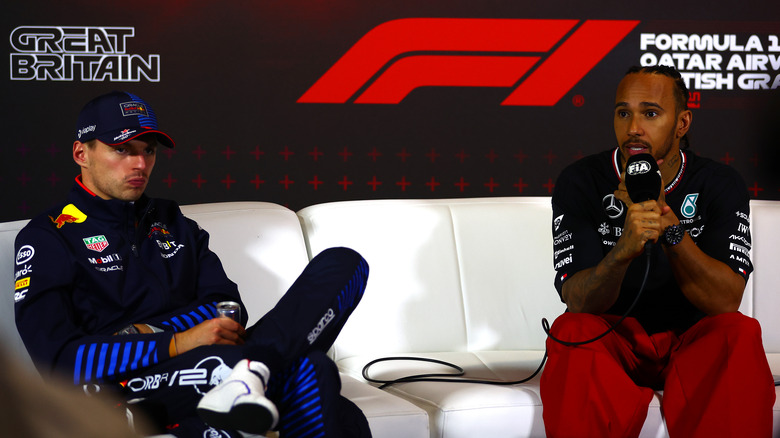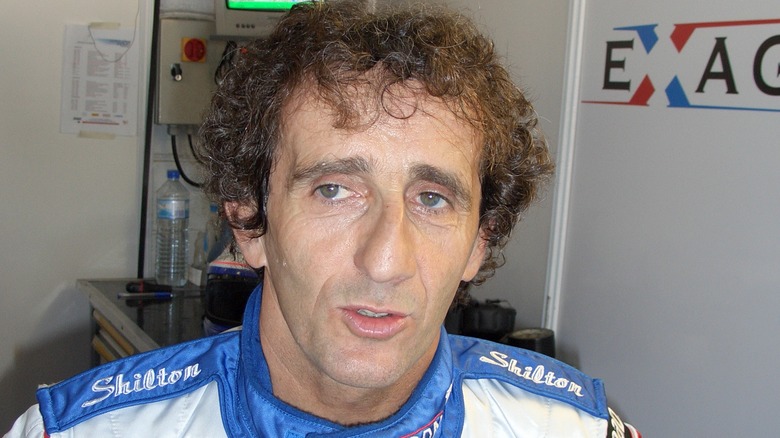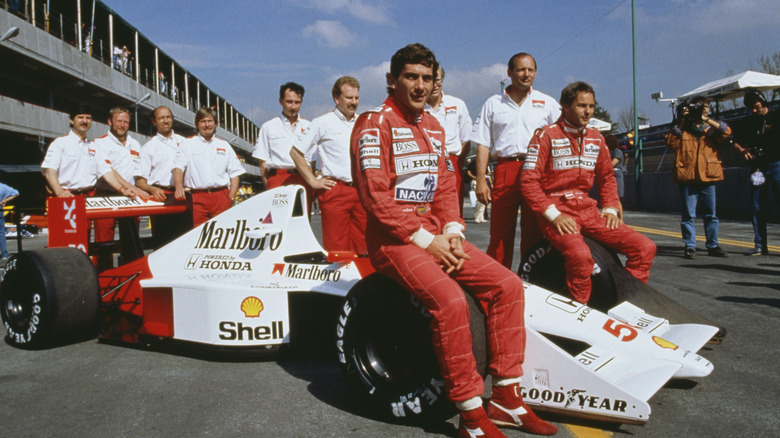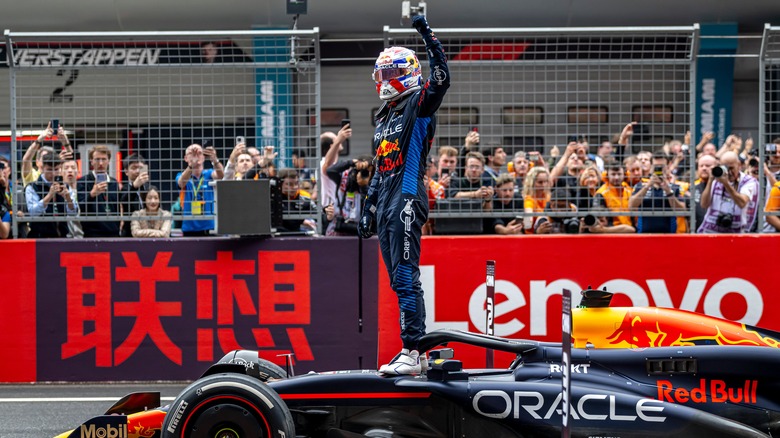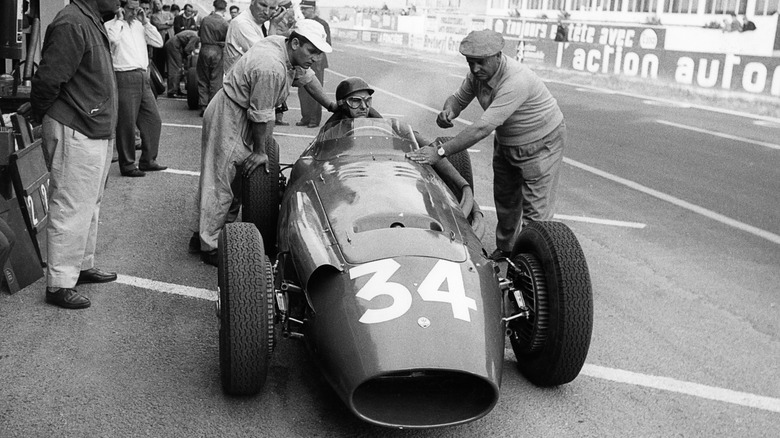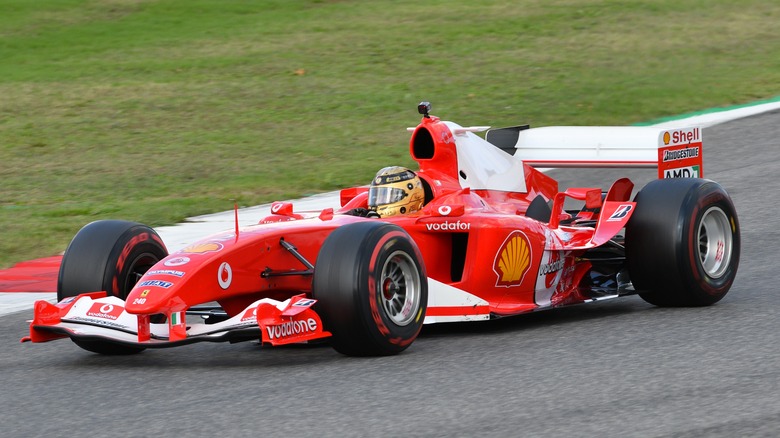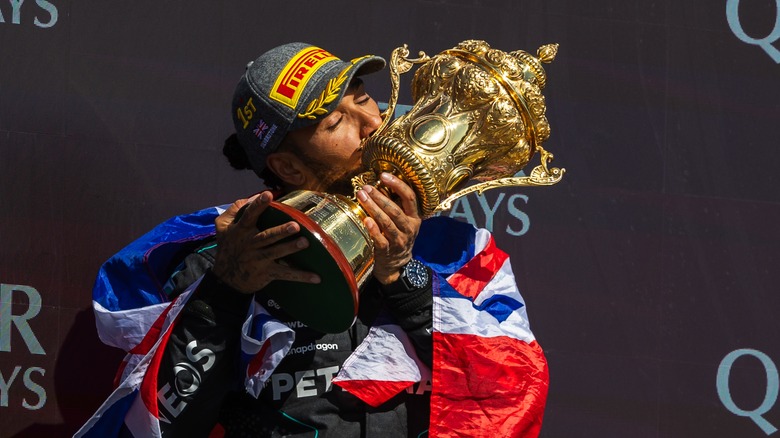The 6 Best Formula 1 Drivers Of All Time, Ranked
The first Formula 1 race was the 1950 British Grand Prix, and since then, F1 has run more than 1,100 races in 34 countries. As of this year's Belgian Grand Prix, there have been 776 drivers to run at least one race in Formula 1. Two of the three most seasoned drivers in Formula 1 history are still currently active. As of this writing, Aston Martin's Fernando Alonso is tops with 392 starts, and Mercedes' Lewis Hamilton is third with 346. If all goes well, Hamilton will pass Kimi Raikkonen for second on that list at the United States Grand Prix in Austin this October. He also may soon be able to run down the 42-year-old Alonso, who may be contemplating retirement. When Alonso won his first driver's championship for Renault in 2005 at 24 years old, he was the youngest champion in F1 history.
Alonso defended his title the following year, but his mark for youngest F1 champion has since been broken twice, by Hamilton in 2008 and Sebastian Vettel in 2010. Vettel's four career championships and 53 race wins land him just outside this ranking of the six best F1 drivers of all time. We assembled this list by looking beyond simply win and championship totals, taking into account the quality of the competition each driver faced and the percentage of wins and podiums earned among total races run. The six drivers below are also responsible for seven of the ten greatest moments in F1 history.
6. Alain Prost
Frenchman Alain Prost won four titles in 1985, 1986, 1989, and 1993, but his career was marked by frequent battles with teammates and management. Prost broke into F1 in 1980 with McLaren, but disagreements with team management led Prost to jump to Renault for 1981. That year, he won his first of nine races in three seasons for Renault. Despite that success, an ongoing feud with teammate Rene Arnoux drove Prost back to McLaren for the 1984 season.
In his second stint with McLaren, Prost flourished. He took 30 checkered flags in six seasons, winning three driver's championships in that stretch and finishing second twice. In 1988, he won seven races but was bested for the championship by teammate Ayrton Senna, with whom Prost clashed in style and personality. In 1989, their conflict came to a head on track at the penultimate race of the season in Japan, and Prost left for Ferrari the following season. In 1990, the race at Suzuka closed out the season, and Senna drove into Prost going into the first turn, knocking out both drivers and clinching his second title.
Prost then jumped to Ferrari, but conflicts with team management led to his firing before the 1991 season ended. He moved to the broadcast booth for a year before returning with Williams to win one more championship in 1993. He then retired rather than team up with Senna again at Williams. Prost went back into TV briefly, then had a short and largely unsuccessful stint as a team owner.
5. Ayrton Senna
Brazilian Ayrton Senna broke into Formula 1 in 1984 with Toleman after a successful karting career, and moved to Lotus after his rookie year. He won six times in three years with Lotus before heading to McLaren in 1988 and beginning the notorious feud with Prost. In six seasons there, he won 35 races and three driver's championships — in 1988, 1990, and 1991. Senna started 161 F1 races, 65 of them from the pole. He finished on the podium 80 times, including 41 wins.
Senna would undoubtedly rank higher on this list had his career gone longer, but he died in a crash at Imola in 1994, in his first season with Williams. Earlier that year, he seemed to presage that incident, saying, "If I ever happen to have an accident that eventually costs my life, I hope it happens in one instant." (via Formula 1). Prost put aside his differences with his former teammate and helped carry Senna's coffin at his public funeral in São Paulo, which was attended by a half a million mourners.
Senna was famous for his risky driving style, which F1 commentator and former driver Martin Brundle called "Just the right side of imbalance. He is so highly developed to the point that he's almost over the edge. It's a close call." (via Formula 1). Senna's greatness extended off the track as well; he donated millions of dollars to help educate children in Brazil, an effort that lives on through the Instituto Ayrton Senna.
4. Max Verstappen
When we recompile this list a decade from now, there's a good chance Max Verstappen will rank even higher than fourth. He has accomplished remarkable things since becoming the youngest driver in F1 history at 17. That debut came in 2015 with Toro Rosso, and he was promoted to the senior Red Bull team for the 2016 season. He became the youngest driver ever to win a race in his Red Bull debut at that year's Spanish Grand Prix, taking the checkered flag 228 days after his 18th birthday.
Verstappen's talent is at least in part genetic. His father Jos earned two podiums in 107 Formula 1 starts, and his mother Sophie Kumpen was a successful and highly regarded karting driver. Max won his first of three straight F1 driver's championships in 2021, and his 2023 title included a record 19 wins in 23 races. As of this writing, he leads the 2024 driver's standings by 78 points over McLaren's Lando Norris, with seven wins and nine podiums so far this season.
Verstappen has finished on the podium in 107 of his first 199 Formula 1 races, with 61 wins. That puts him third on the all-time wins list in less than a decade of racing, and his three world championships are more than all but five drivers in F1 history. He is on track to crack that top five this season, and will most likely move further up that list in the years to come.
3. Juan Manuel Fangio
Juan Manuel Fangio's success in the early years of Formula 1 racing is unparalleled. He won five F1 titles in seven full seasons, and finished second in the other two. Fangio ran his first Grand Prix in 1948, and won his first championship in 1951 over Alberto Ascari. Fangio then proceeded to take the title again for four straight years from 1954 through 1957. His first championship came in Mercedes' all-new 196 R, and he also won while driving for Alfa Romeo, Maserati, and Ferrari.
Fangio retired in 1958 with 24 wins and 35 podium finishes in 51 starts, and he won his last championship at the age of 46. After Fangio's final season, he was kidnapped by Cuban revolutionaries in an attempt to win sympathy for their movement, but his infectious personality won his captors over, and he was quickly released.
Fangio was famously humble and gracious. Teammate and rival Stirling Moss is quoted on the Formula 1 website as saying, "I can't think of any facets of Juan's character which one wouldn't like to have in one's own." Unlike Prost, Fangio was a true team player and often worked aside his mechanics. He was one of six children born in Argentina to Italian immigrant parents, and began working as a mechanic at the age of eleven. Fangio's humble upbringing and decades of wrenching experience are reflected in his conduct, record, and legacy, and made him a formidable competitor in Formula 1.
2. Michael Schumacher
As dominant as Fangio was in Formula 1's first decade, so was German Michael Schumacher in the 1990s and early 2000s. He broke into F1 in 1991 and was hired by Benneton the next year, when he won his first race at Belgium's Spa-Francorchamps circuit. He stayed with Benneton for four seasons, winning 19 races and the 1994 and 1995 driver's championships. He then moved to Ferrari, which hadn't won a title since 1979, and helped to quickly bring them back into contention. His second-place finish in 1997 was wiped from the books as punishment for a clash with Jacques Villeneuve, but he rebounded with a true second-place showing the next year.
A broken leg interrupted Schumacher's 1999 season, but he ripped off five straight driver's titles from 2000 through 2004. He won 11 of 17 races in 2002 and 13 of 18 in 2004, breaking Fangio's record for career championships in the year between. Like Fangio, Schumacher worked closely with his crew to make Ferrari as competitive as possible, and like Senna, he gave large sums of his fortune away to help disadvantaged children. Schumacher also donated $10 million to help victims of the 2004 tsunami in the Indian Ocean, and briefly retired after the 2006 season. He returned with Mercedes in 2010 and stayed there for three relatively underwhelming seasons, ending his career with a record seven driver's championships and 91 wins in 307 starts.
1. Lewis Hamilton
Lewis Hamilton came into Formula 1 in 2007 with tires smoking. Driving for McLaren, he scored four wins and 12 podium finishes, losing the championship to Kimi Raikkonen by a single point. The next year, Hamilton became F1's youngest-ever driver's champion at about two months shy of his 24th birthday. He replaced the freshly retired Schumacher at Mercedes in 2013, and outdueled his old friend and new teammate Nico Rosberg for his second title the next year. He matched Senna in 2015 with his third championship, but lost a nip-and-tuck battle with Rosberg by five points in 2016.
Hamilton was brilliant in 2017, with nine wins and 13 podium finishes in 20 races. He fared even better in 2018, winning 11 times in 21 races and finishing in the top three on six other occasions. He ran his championship streak to four straight years with wins in 2019 and 2020, but lost the 2021 title to Verstappen on a last-lap pass in the season-ending race in Abu Dhabi. Hamilton holds or shares nearly every major Formula 1 record. His seven driver's championships are tied with Schumacher for the most ever, and Hamilton holds the marks for most wins (105 in 346 starts through this year's Belgian Grand Prix), poles (104 and counting), and podiums (201). Hamilton has also made history as Formula 1's first and only black driver, and — like Senna — has done considerable work off the track to provide opportunities for disadvantaged young people. He's leaving Mercedes for Ferrari next season.
